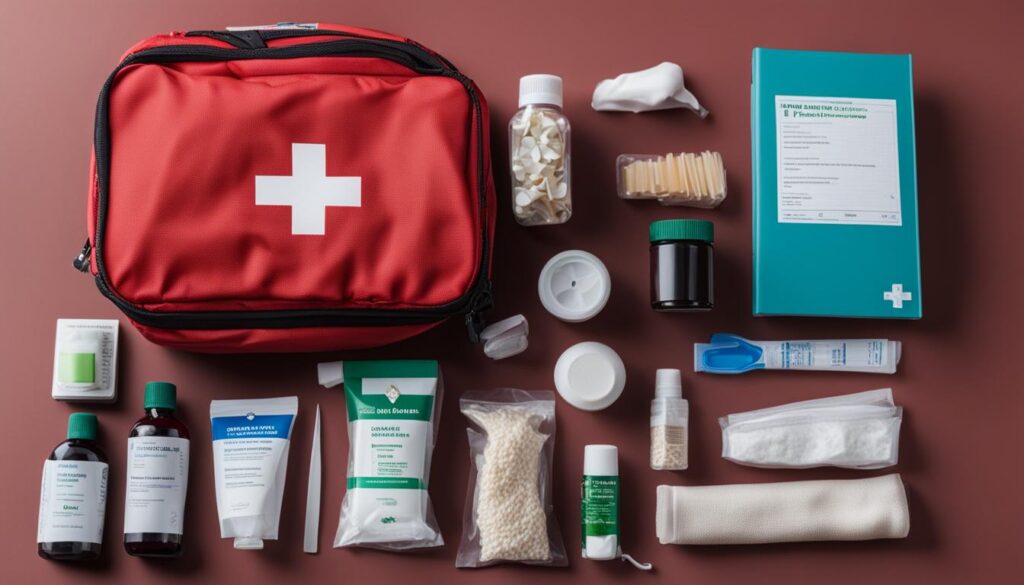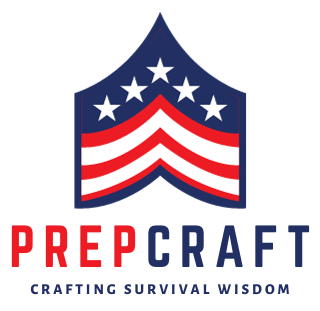
When it comes to being prepared for any scenario, I understand the importance of continuous learning. As a survivalist, I know that acquiring knowledge through books, taking courses, and accessing resources can enhance my survival skills and preparedness. In this article, I will explore different categories of prepper learning, focusing on books, courses, and resources that are essential for survivalists like me.
Key Takeaways:
- Continuous learning is crucial for survivalists to enhance their skills and preparedness.
- Books provide valuable knowledge on various aspects of survival, such as medical, outdoor skills, food preservation, and self-defense.
- Courses designed for preppers offer hands-on training in wilderness survival, first aid, and self-defense.
- Survivalist resources, including websites, forums, and blogs, provide a platform for learning and exchanging ideas among experienced preppers.
- Medical preparedness and outdoor and bushcraft skills are essential focus areas for survivalists.
Essential Books for Survivalists

Having a library of survival books is crucial for every prepper. These books provide valuable knowledge and insights into various aspects of survival, including medical, outdoor and bushcraft, home repair, homesteading, foraging, growing and preserving food, hunting and fishing, self-defense, and more. Some highly recommended books for survivalists include:
| Book | Author |
|---|---|
| “The Survival Doctor’s Complete Handbook” | James Hubbard |
| “When All Hell Breaks Loose” | Cody Lundin |
| “SAS Survival Handbook” | John Wiseman |
| “The Self-Sufficient Life and How to Live It” | John Seymour |
| “Just in Case” | Kathy Harrison |
These books cover a wide range of survival topics and offer practical advice and strategies for navigating challenging situations. From first aid to self-sufficiency, these resources provide essential information that can help survivalists thrive in any scenario.
Courses for Preppers
In addition to reading books, taking courses specifically designed for preppers can provide valuable hands-on training and practical skills. These courses cover a wide range of topics, including wilderness survival, first aid and medical training, self-defense, food preservation, homesteading, bushcraft skills, and more.
What Can You Learn?
When it comes to prepper courses, there are numerous options available that cater to different areas of preparedness. Whether you’re interested in honing your survival skills in the great outdoors or learning life-saving medical techniques, there’s a course for you.
Here are some popular prepper courses:
- Bear Grylls Adventure book series unit study: This course delves into the strategies and techniques taught in Bear Grylls’ adventure books, providing hands-on instruction in wilderness survival skills.
- Wilderness survival courses: These courses focus on essential survival skills such as shelter building, fire starting, navigation, food foraging, and more, preparing you for unexpected challenges in the wilderness.
- First aid and CPR training: Knowing how to administer first aid and CPR can save lives in emergencies. These courses teach you basic life-saving techniques and equip you with the knowledge to handle medical situations effectively.
- Self-defense classes: Learning self-defense techniques is crucial for personal safety. These courses teach you practical skills to protect yourself and your loved ones in dangerous situations.
These are just a few examples of the diverse prepper courses available. Depending on your interests and areas of focus, you can find courses that cater to your specific needs.
By enrolling in prepper courses, you can gain hands-on experience and valuable insights from instructors who specialize in their respective fields. These courses provide a structured learning environment and an opportunity to practice essential skills, ensuring you are well-prepared for whatever challenges may come your way.
Survivalist Resources

Apart from books and courses, survivalists can also benefit from various online and offline resources. These resources provide valuable information, guidance, and support for preppers looking to enhance their knowledge and skills. By accessing these resources, survivalists can become more prepared and confident in their ability to handle challenging situations.
Online Resources
Survivalist websites, forums, blogs, YouTube channels, and social media groups offer a wealth of information and a platform for learning, exchanging ideas, and gaining insights from experienced survivalists. Some popular online resources for survivalists include:
- The Prepared: A comprehensive website that covers a wide range of prepping topics, including emergency preparedness, gear reviews, and survival skills.
- The Survival Medicine Handbook: A trusted resource for medical information and guidance in emergency situations when access to professional medical help may be limited.
- The Peterson Field Guide to Medicinal Plants & Herbs: A valuable reference for identifying and utilizing medicinal plants in a survival scenario.
Additionally, there are various online communities and forums where survivalists can connect with like-minded individuals, share experiences, ask questions, and seek advice. These platforms foster a sense of community and provide a support network for preppers.
Offline Resources
In addition to online resources, survivalists can also find valuable information and support from offline sources. Community organizations and local clubs dedicated to survivalism and preparedness often host meetings, workshops, and training sessions.
“Learning from experienced survivalists in person is an invaluable opportunity to gain hands-on skills and practical knowledge.”
Attending these events enables preppers to learn from experienced survivalists in person, interact with experts, and acquire practical skills. Local libraries may also have a collection of survival-focused books and resources available for loan.
Comparison of Survivalist Resources
| Resource | Type | Features |
|---|---|---|
| The Prepared | Website | Comprehensive information on various survival topics, gear reviews, and expert advice. |
| The Survival Medicine Handbook | Book | In-depth medical information and guidance for emergency situations. |
| The Peterson Field Guide to Medicinal Plants & Herbs | Book | Detailed reference for identifying and utilizing medicinal plants. |
| Local community organizations | Offline | Opportunities for in-person learning, workshops, and training sessions. |
| Local libraries | Offline | Access to survival-focused books and resources. |
When utilizing these resources, it’s important for survivalists to critically evaluate the information provided and tailor it to their specific needs and circumstances. Incorporating a variety of resources into their learning journey can help preppers develop a well-rounded skill set and a deeper understanding of survivalism.
Medical Preparedness

Medical preparedness is a crucial aspect of survivalism. In emergencies or disaster situations, having the necessary medical knowledge and resources can make a significant difference. To ensure you’re equipped to provide medical care when professional help is not available, it’s essential to learn from trusted medical books.
One highly recommended resource is The Survival Medicine Handbook by Dr. Joseph Alton and Amy Alton. This comprehensive guide covers a wide range of medical topics relevant to survival situations, including wound care, infectious diseases, respiratory conditions, and more.
Another valuable book is Where There Is No Doctor by David Werner and Carol Thuman. This widely acclaimed resource offers practical guidance on diagnosing and treating common health problems in low-resource settings, making it an invaluable tool for survivalists.
When it comes to dental care during emergencies, Where There Is No Dentist by Murray Dickson is an essential read. This book provides step-by-step instructions on managing dental issues when professional dental care is not accessible, ensuring proper oral health in challenging circumstances.
| Medical Books for Survivalists | Description |
|---|---|
| The Survival Medicine Handbook by Dr. Joseph Alton and Amy Alton | This comprehensive guide covers a wide range of medical topics relevant to survival situations, including wound care, infectious diseases, respiratory conditions, and more. |
| Where There Is No Doctor by David Werner and Carol Thuman | This widely acclaimed resource offers practical guidance on diagnosing and treating common health problems in low-resource settings, making it an invaluable tool for survivalists. |
| Where There Is No Dentist by Murray Dickson | This book provides step-by-step instructions on managing dental issues when professional dental care is not accessible, ensuring proper oral health in challenging circumstances. |
By delving into these medical books, you’ll gain the knowledge and skills necessary to address medical emergencies when help is not readily available. Remember, being prepared can mean the difference between life and death.
Outdoor and Bushcraft Skills
Outdoor and bushcraft skills are crucial for survivalists who may find themselves in the wilderness or remote areas. These skills enable individuals to navigate and thrive in challenging environments, making them essential for any prepper’s arsenal. Fortunately, there are numerous resources available, including books that provide comprehensive guidance on a wide range of outdoor survival techniques.
When it comes to outdoor and bushcraft skills, a few books stand out as excellent resources for prepper learning. These books cover various aspects of survival, from shelter building to food foraging and basic navigation. Consider adding the following titles to your survival library:
- 98.6 Degrees by Cody Lundin
- Bushcraft 101 by Dave Canterbury
- Thrive: Long-Term Wilderness Survival Guide by Juan Pablo Quiñonez
- Primitive Wilderness Living & Survival Skills by John and Geri McPherson
These books offer practical insights and valuable knowledge that can help you develop the skills necessary to survive and thrive in outdoor scenarios. Whether you’re looking to build a robust shelter, identify edible plants, or navigate with a compass, these resources have got you covered.
“The wilderness holds answers to questions we have not yet learned to ask.” – Nancy Newhall
Conclusion
Continuous learning is a critical part of being a survivalist. As a survivalist, I understand the importance of staying prepared for any scenario. That’s why I recommend investing in prepper learning through books, courses, and accessing valuable resources. These tools allow us to enhance our skills, knowledge, and overall preparedness for any situation that may arise.
By immersing ourselves in prepper learning, we can develop the necessary skills and mindset to thrive in challenging situations. Whether it’s learning from books that cover a wide range of survival topics or taking specialized courses that provide hands-on training, each form of learning equips us with essential knowledge and practical skills.
Furthermore, resources like websites, forums, and online communities dedicated to survivalist learning offer a platform for exchanging ideas and gaining insights from experienced individuals. Accessing these resources not only expands our knowledge base but also provides a sense of community and support.
So, whether you’re just starting your prepper journey or looking to expand your skills, I encourage you to embrace prepper learning. Educate yourself through books, enroll in courses, and tap into the wide range of resources available. Don’t wait for an emergency to strike; start your prepper learning today and equip yourself with the tools you need to ensure the safety and well-being of yourself and your loved ones.
FAQ
Why is continuous learning important for survivalists and preppers?
Continuous learning allows survivalists and preppers to enhance their skills and knowledge, ensuring preparedness for any scenario.
What are some recommended books for survivalists?
Highly recommended books for survivalists include “The Survival Doctor’s Complete Handbook,” “When All Hell Breaks Loose” by Cody Lundin, “SAS Survival Handbook” by John Wiseman, “The Self-Sufficient Life and How to Live It” by John Seymour, and “Just in Case” by Kathy Harrison.
What types of courses are available for preppers?
Prepper courses cover a wide range of topics, including wilderness survival, first aid and medical training, self-defense, food preservation, homesteading, and bushcraft skills.
What resources can survivalists benefit from?
Survivalists can benefit from various online and offline resources, including websites, forums, blogs, YouTube channels, social media groups, and community organizations dedicated to sharing knowledge and providing support for preppers.
What are some important medical books for survivalists?
Important medical books for survivalists include “The Survival Medicine Handbook” by Dr. Joseph Alton and Amy Alton, “Where There Is No Doctor” by David Werner and Carol Thuman, and “Where There Is No Dentist” by Murray Dickson.
Which books provide guidance on outdoor and bushcraft skills?
Books like “98.6 Degrees” by Cody Lundin, “Bushcraft 101” by Dave Canterbury, “Thrive: Long-Term Wilderness Survival Guide” by Juan Pablo Quiñonez, and “Primitive Wilderness Living & Survival Skills” by John and Geri McPherson provide comprehensive guidance on outdoor survival techniques and bushcraft skills.


